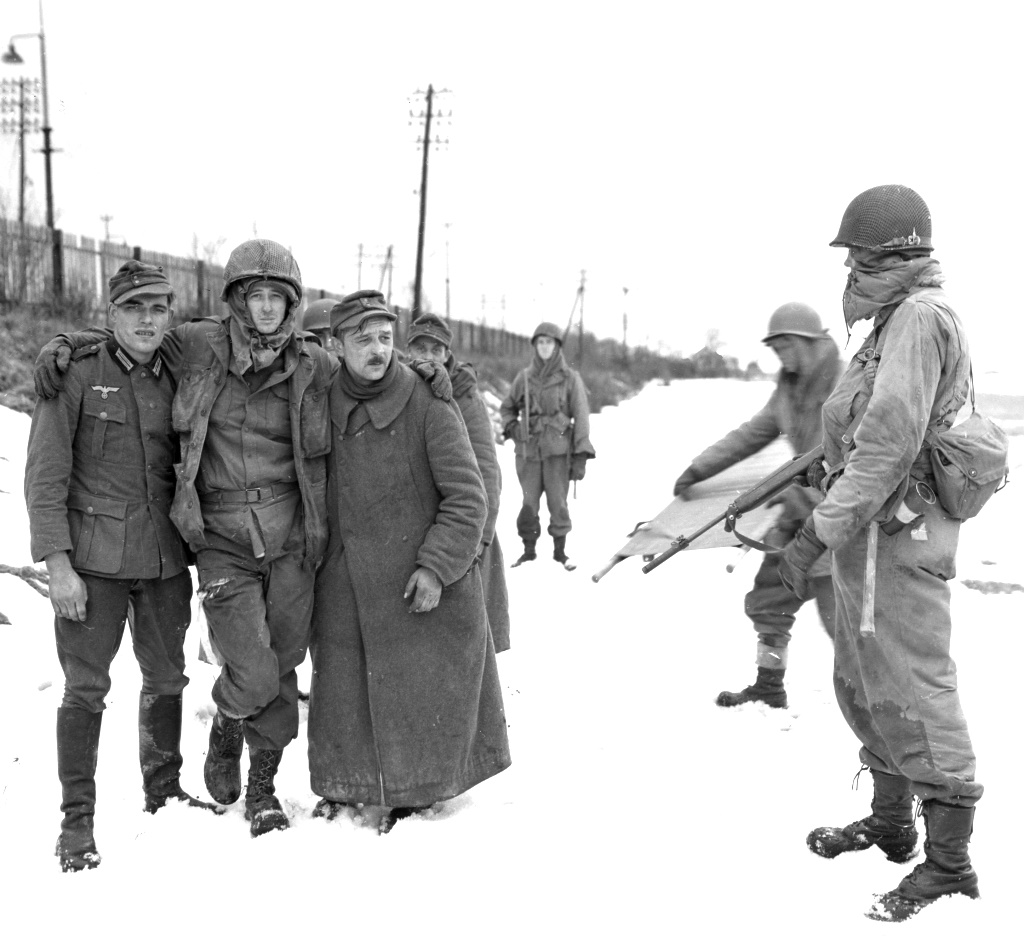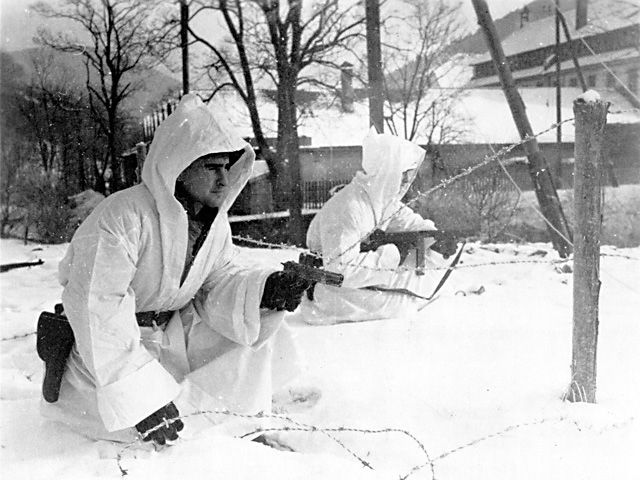The men stumbled often where snow-covered weeds tripped them or a dip in the ground provided an extra-deep pocket of snow. About midway across the flat plain, the skirmishers began to close to the right. Intervals that had been ten yards between men shrank to five yards and in some cases, two men would be trudging through the snow almost shoulder to shoulder. It had become apparent by this time that the 2nd Plat, on the right, would enter the Rothleible Woods first, since the dark line of trees drifted back and away from the sector fronting the 3rd Plat. Men anxious to edge over toward the safety of the trees were hard to correct when they began closing to the right. The platoon leader ranged from one end of his skirmish line to the other, ordering the men to open again to the left. Under this urging, the interval between men widened somewhat, although still remaining dangerously under the five-yard mark in many cases.
The dark line of trees ahead and to the right front grew taller and bolder against the night sky. The only sound was the faint crunch of the dry snow crust as the men trudged through it. The platoon could almost feel the dark trees reaching out and over them with new cover and concealment. This quiet world was suddenly broken. To the right, from the snowy obscurity in front of the 2nd Plat, rang out one word, ‘Halt’. The voice sounding it began on a low, hailing note but wound up on a loud, startled, questioning challenge that hung in the air. The whole line in the 3rd Plat quivered and stopped at the shock of that word, as though a barrier had clamped down shut in front of it. One or two voices shouted unintelligible words over in the darkness obscuring the other platoon. A rifle shot exploded in the night, and then two, and then a ragged volley. Almost immediately a German heavy machine gun burst into a flaming chatter about 50 to 60 yards in front of the point where the 2nd and 3rd Plats joined. This gun was firing to its left front and so away from the 3rd Plat, directly into the bulk of Lt Conklin’s men. A bedlam had suddenly broken loose. All up and down the American line rifles cracked and spat, and squad leaders and platoon leaders of both platoons were shouting to their men to push on in upon the enemy.
Fire from the one German heavy machine-gun set aflame an accompanying line of angry rifle splats and flashes to either side of it and quickly awoke, far over in front of the 2nd Plat’s right flank, a second enemy machine-gun that spluttered once and then settled down to fierce, savage bursts of prolonged fire. At this point the Americans did an awful thing, almost to a man, they hit the flat, open ground as though they were on a rifle range and began a duel with the enemy line in the darkness to their front. The platoon leader of the 3rd Plat ran along his line of prone men, screaming to them above the firing to get up and move forward. His shouts and the cries of the squad leaders caught the enemy’s attention; and for the first time since that initial startled challenge and the following shots, the nearest German automatic weapon turned its fires squarely upon the 3rd Plat, concentrating fire towards its leaders’ hoarse shouts. Tracer tore across the snow knee-high, raking the area. A man lying on the snow a little to the right rear of the platoon leader received the full impact of one burst of enemy fire which tore past the platoon leader’s knees.
Men of the platoon remained glued to the ground. In the desperate belief that the men would rise and follow him, the platoon leader moved forward and out in front of his platoon. Despite the horrible din, he caught or thought he caught, the voices of at least two of his squad leaders answering him. So, crying for his men to follow, he moved forward. About ten yards out he suddenly stumbled into a shallow ditch, falling to his knees when the ground disappeared from under his feet. The Discovery of this ditch, which was about four feet wide and one foot deep, seemed a godsend. The firing to his immediate front was still only weak rifle fire, and the German machine-gun to his right front had again changed its tactics and was making the mistake of firing at any and all areas to its front and flanks. The enemy defense on this flank seemed weak.
 He devoted his attention to an effort to get his men up to the ditch, where he now felt there was a good chance to organize a small assault group on the enemy’s weak right flank that would not only be successful but which would provide a position for enfilade fire down the enemy’s line toward both hostile machine-guns.
He devoted his attention to an effort to get his men up to the ditch, where he now felt there was a good chance to organize a small assault group on the enemy’s weak right flank that would not only be successful but which would provide a position for enfilade fire down the enemy’s line toward both hostile machine-guns.
Darkness was rapidly fading away. The added light was most apparent when he realized that he now not only saw the German machine-gun flashes but could actually see clouds of smoke billow up with the shattering light and noise. He faced towards his platoon and shouted for the men to come forward, that there was protection in the ditch with him. One man ran up and threw himself into the ditch, Pfc Stephen Ludlam, a rifle grenadier. Ludlam was told to concentrate on the enemy machine gun to the right front, to keep the gun silent at all costs. The soldier fired all of his rifle grenades at this gun and then, when none of these was successful, laid down a steady, rapid-fire upon the enemy weapon with fire from his M-1. He was firing too fast, however, sight shots of rapid-fire every time he loaded a clip. A single shot from an enemy rifleman smashed into his forehead and killed him.
A BAR man (Browning Automatic Rifle) Pfc Emmett R. Teague, dashed up to the ditch and threw himself forward into it, receiving, even as he fell, a deadly wound that made him grunt and go lax. His body hit the snowbank on the other side of the narrow ditch with a thud and lay still. Two of the squad leaders, Pfc Spaeth and Pfc Hubbs won up to their platoon leader also, both entering the ditch about ten yards to his right. Each of these men carried a Thompson sub-machine gun, neither of which was functioning. Nor could the two men remedy the malfunctions. The only man whom the platoon leader had with him at this time were two squad leaders, the dead rifle grenadier, and the dead BAR man. Of the three men living, the platoon leader had the only weapon which worked, an M-1 carbine, for which he had left one magazine that he could reach, the others having been dropped and lost in the snow. He had used up his hand grenades, in throws that did not reach the hostile machine gun. His fingers froze to the iron of the grenades when he held them in his bare hand.
After Ludlam’s death, the platoon leader himself directed an occasional aimed shot at the enemy machine gun to his right front. Perhaps partly because of this fire, but mostly because the American skirmish line which had at first existed in front of it gradually vanished in withdrawals of individuals back across the field or in the deaths of those who were still left, this gun no longer fired as often or as rapidly as it had during the first hot minutes of surprise. But the attack had failed. In the fast-growing gray light of dawn, no living, effective members of Easy Co remained in the flat open field. The platoon leader and his two squad leaders were alone. All three now kept their heads low in the ditch, which they discovered was a stream or irrigation ditch, covered with ice about two to three inches thick. The banks were from a foot to eighteen inches high. Pfc Spaeth, one of the two squad leaders, retrieved the M-1 belonging to the dead Ludlam. An effort, made just before daylight, to make use of the BAR belonging to the other dead man, had been unsuccessful. The weapon would not fire. American artillery began to fall in on the field, artillery that was meant for the Germans in position about 30 yards away from the frozen streambed in which the three Easy Co men were trapped. The danger from this friendly fire was as great as had been the danger earlier from enemy small-arms fire, and it was a danger that was to last over a longer period than had that other.
Lying flat in the stream bed, the platoon leader dragged a rumpled map from his pocket and he and his squad leaders crawled together and consulted the map. They decided to crawl farther toward the east. In this direction the stream curved in to meet the woods, in which Germans could now be expected but the three pooled their ideas concerning the German resistance and agreed that no fire had been coming from this section of the woods earlier. Hand grenades were retrieved from both the dead men and Pfc Spaeth gathered up what ammunition he could from Ludlam’s body, there were only a few 30.06 clips.



















